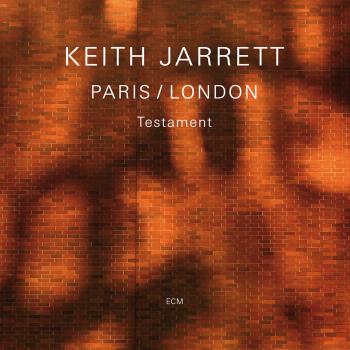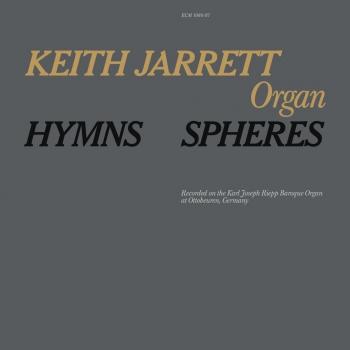
Mysteries Keith Jarrett
Album info
Album-Release:
1976
HRA-Release:
30.04.2015
Label: Universal Music / impulse! Records
Genre: Jazz
Subgenre: Free Jazz
Artist: Keith Jarrett
Composer: Keith Jarrett [Non-Classical Composer]
Album including Album cover
I`m sorry!
Dear HIGHRESAUDIO Visitor,
due to territorial constraints and also different releases dates in each country you currently can`t purchase this album. We are updating our release dates twice a week. So, please feel free to check from time-to-time, if the album is available for your country.
We suggest, that you bookmark the album and use our Short List function.
Thank you for your understanding and patience.
Yours sincerely, HIGHRESAUDIO
- 1 Rotation 11:01
- 2 Everything That Lives Laments 10:04
- 3 Flame 06:09
- 4 Mysteries 15:02
Info for Mysteries
„Another in Impulse's extensive series of Keith Jarrett Quintet recordings, this album isn't one of the more coherent products of the run. It opens on a faltering note with the hopelessly diffuse and rambling 'Rotation,' and 'Everything That Lives Laments' doesn't really get going until a lyrical Vince Guaraldi-like statement from Jarrett sets the track in motion. 'Flame' is certainly novel, with Jarrett on Pakistani flute and Dewey Redman on Chinese musette, which combined with the percussion makes for a diverting India/Third World jam. The Coltrane-ish 15-minute title track has passages of meditative beauty and others of listless torpor. For completists only.“ (Richard S. Ginell, AMG)
Keith Jarrett, piano, flute, percussion
Dewey Redman, tenor saxophone, musette, percussion
Charlie Haden, double bass
Paul Motian, drums, percussion
Guilherme Franco, percussion
Recorded on December 10, 1975 at Generation Sound Studios, New York City
Mixed and masted at Kendun Recorders, Burbank, Calif.
Engineered by Tony May
Produced by Esmond Edwards
Digitally remastered
Keith Jarrett
At the end of 2008, Keith Jarrett added two concerts to his schedule at short notice – one at Paris’s Salle Pleyel (November 26), one at London’s Royal Festival Hall (December 1) . The music on “Testament” is from these concerts. Their range is compendious, Jarrett’s improvisational imagination continually uncovering new forms, in a music stirred by powerful emotions. In his liner notes, the pianist is forthright about the personal circumstances promoting a need to lose himself in the work once more.
He also reminds the reader/listener that “it is not natural to sit at a piano, bring no material, clear your mind completely of musical ideas and play something that is of lasting value and brand new.” This, however, has been the history and substance of the solo concerts since Jarrett initiated them, almost forty years ago . Over time their connection to ‘jazz’ has often become tenuous, yet Jarrett’s solo concerts, with the foregrounding of melody and the continual building, and relinquishing, of structure, are also removed from “free improvisation” as a genre. Jarrett’s solo work is effectively its own idiom, and has been subject to periodic revisions by the pianist. “In the early part of this decade, I tried to bring the format back: starting from nothing and building a universe.”
Since the “Radiance” album and the “Tokyo Solo” DVD of 2002 Jarrett has been adjusting the flow of the work, more often working with shorter blocks of material. “I continued to find a wealth of music inside this open format, stopping whenever the music told me to.” This approach distinguished “The Carnegie Hall Concert” (2006), and it is most effectively deployed in “Testament” , where the strongly-contrasting elements of the sections of the Paris concert in particular have the logic of a spontaneously-composed suite. The nerves-bared London performance (the first UK solo show in 18 years) is different again: “The concert went on and, though the beginning was a dark, searching, multi-tonal melodic triumph, by the end it somehow became a throbbing, never-to-be-repeated pulsing rock band of a concert (unless it was a church service, in which case, Hallelujah!).”
In the end, the improviser does what must be done. As Keith Jarrett said, a long time ago, “If you’re a rock climber, once you’re halfway up the face of the cliff, you have to keep moving, you have to keep going somewhere. And that’s what I do, I find a way.”
These days, however, Jarrett is rationing the number of ascents: there have been less than thirty solo concerts in the last decade, making “Testament” a special event indeed. Two further solo performances are scheduled for 2009 – at the Palais des Beaux Arts in Brussels on October 9, and at Berlin’s Philharmonie on October 12.
This album contains no booklet.


























